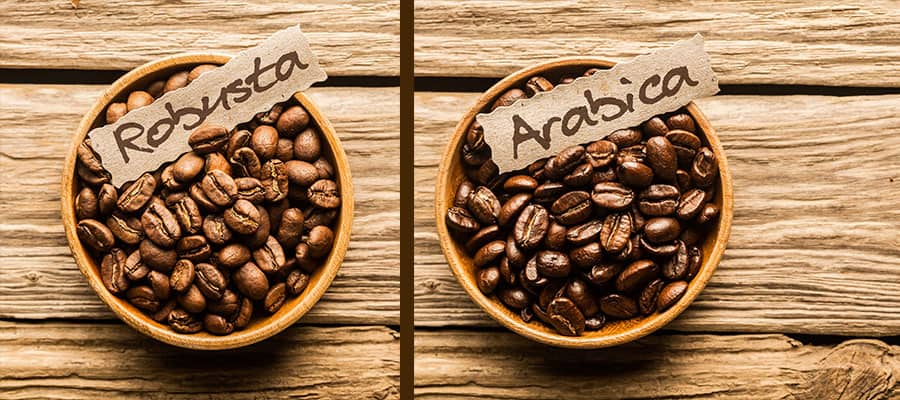The Ultimate Guide to Arabica and Robusta Coffee Types

Curious about the difference between Arabica and Robusta beans? Put on your learning caps as it’s time to brew a fresh cup of coffee! Arabica coffee in Brazil and Robusta beans are the two most popular coffee varieties. Hopefully, our brief but informative guide would help you find the right brew for your needs.
Introduction to Arabica and Robusta coffee
Arabica coffee is made from the beans of the Arabica coffee plant. It originated in Ethiopia and is now the world’s most popular coffee type, constituting over 60% of the coffee consumed all around the globe.
On the other hand, Robusta coffee is obtained from the beans of the Canephora coffee plant, with its origins in Africa. Robusta coffee is bitter than the Arabica type and is thus popularly used in espresso, instant coffee, or as a filler in few blends of ground coffee.
Difference between Robusta and Arabica coffee in Brazil
If you consider yourself a coffee aficionado, you’re probably familiar with the words Arabica and Robusta. But for those who aren’t, these are two different types of coffee beans, grown commercially. While they are harvested, roasted, and brewed much in the same way, the similarities end right there! When it comes to the taste, quality, or even the pricing, they’re nothing alike.
- Taste: Unroasted Robusta beans have a somewhat raw-peanut-like taste, and the coffee has an oatmeal-like taste. The taste can be summed up as being somewhere between neutral and harsh. On the other hand, Arabica coffee comes with a varied taste range, courtesy of its own variations such as Typica, Caturra, Pacamara, Kona, and more. So, when you go buy Arabica coffee in Brazil, you’d find some that have a sweet-soft taste, while there can be some that boast a sharp-tangy taste. When Arabica beans are roasted, they smell like blueberries – a perfume kind of smell with small hints of fruit and sugar.
- Growing environment: The Robusta coffee is derived from a resilient plant that can be grown in the lower altitudes – between 200-800 m. Because of being resilient, the plant and the beans aren’t susceptible to damage by pests, have a low production cost, and generate more finished product per acre when compared to Arabica coffee. On the other hand, the beans of the Arabica coffee plant are fragile and can only be grown in cool, subtropical places. They need lots of moisture, shade, rich soil, and the right amount of sun. As the plants and the beans are fragile, they are more susceptible to attacks from pests, and can even suffer if not properly taken care of or because of exceedingly cold temperatures. These are typically grown on an elevation of 600-2000 m.
- Pricing: Robusta is the cheaper alternative to Arabica, but is bad for the environment and your taste buds! Robusta follows a mono-cropping method. As it can be grown literally anywhere in the lower altitudes, big companies clear acres of rainforest to plant Robusta beans. The excessive mono-cropping erodes the soil of its nutrients, making it unsuitable for future use. On the other hand, Arabica coffee is the expensive kind. Thus, companies often mix Robusta with their Arabica blend to heighten their profits and serve you a crappy coffee! So, the next time you’re out shopping for coffee, look for 100% Arabica beans.
Key takeaway
There’s clearly no contest between the Arabica and the Robusta brew as they are way different in every respect. So, go for the one that best suits your taste bud and budget. Apart from all that we’ve already mentioned, Robusta features more caffeine when pitted against Arabica, while the latter contains twice the sugar than Robusta. Lastly, Robusta has less acidity, while Arabica has more lipids. But if you don’t care about all these differences and want to judge them only on the basis of taste, we certainly have a clear winner! The Arabica coffee in Brazil tastes much better than a cup of Robusta. Get it from a reliable platform and rest easy knowing that you’ve laid hands on genuine 100% pure Arabica coffee – total value for money.